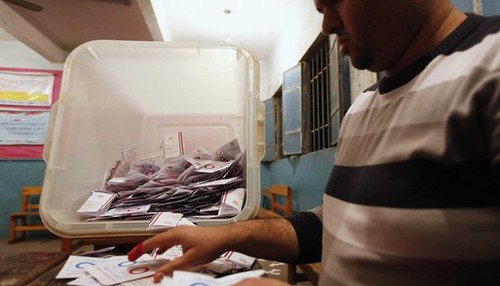
Egypt referendum on the new amended constitution was held on January 14-15, 2014. The authorities say up to 55% participated despite the boycott., a photo by Pan-African News Wire File Photos on Flickr.
15 January 2014
Last updated at 20:23 ET
BBC World Service
Egypt 'turnout 'high' in boycotted referendum - officials
Officials say there was a high turnout in a referendum on a new constitution in Egypt, with voters expected to endorse the removal of Islamist President Mohammed Morsi.
After polls closed top election official Nabil Salib told state TV that voter turnout was higher than in previous polls, AP news agency said.
The second day of voting on Wednesday passed off largely peacefully.
Nine people died on Tuesday in clashes involving Mr Morsi's supporters.
Some 400 people are said to have been arrested over the two days for disrupting the vote.
A senior interior ministry official told a private TV channel that turnout in the vote may exceed 55%, Reuters news agency said. He said preliminary results indicated that approval of the constitution may be more than 95%.
However, turnout was reported to be low in Muslim Brotherhood strongholds.
Mr Salib did not give a figure for voter turnout but said results were expected to be announced on Friday. State TV said initial results showed 50% turnout with more than 90% voting yes.
"The turnout will be the highest if compared to past polls," he was quoted as saying.
In the December 2012 constitutional referendum held while Mohammed Morsi was in power, 33% of Egypt's 53 million voters took part in the ballot. It was approved by 64% of voters.
The BBC's Kevin Connolly in Cairo says that there is no serious doubt that the authorities will get the yes vote they crave, not least because the referendum has been boycotted by President Morsi's Muslim Brotherhood party.
Our correspondent says that the level of participation in the poll is crucial - the army needs a strong turnout to endorse its own political powers and pave the way for its leader Gen Abdel Fattah al-Sisi to run for president.
It is the country's third constitutional referendum in as many years - the army hopes that it will draw a line under a period of often violent turmoil.
Morsi supporters blocked a metro station in a Cairo suburb, stopping some trains, security officials said, but were quickly dispersed by police.
The new charter is to replace the constitution passed during the rule of Mr Morsi before he was removed last July. It remains unclear when exactly full results will be announced.
The BBC's Sally Nabil, at a polling station in Alexandria on Wednesday, said the number of people queuing as voting began was noticeably lower than at the same time the previous day.
However, another polling station for voters from outside Alexandria was busy, our correspondent reports.
Correspondents in Cairo also suggest that polling stations were not as busy as on Tuesday. The BBC's Ahmed Kilany says it was a similar story in the southern cities of Assiut and Sohag.
A huge security operation was in evidence throughout the two days of voting, with some 160,000 soldiers and more than 200,000 policemen deployed nationwide.
'Work hard'
The referendum is believed likely to lead to elections later in the year and Gen Sisi, who backed the overthrow of Mr Morsi, is considered almost certain to stand for president.
The new constitution was drafted by a 50-member committee that included only two representatives of Islamist parties.
The authorities maintain that it is a crucial step towards stability.
Under the new constitution:
The president may serve two four-year terms and can be impeached by parliament
Islam remains the state religion - but freedom of belief is absolute, giving some protection to minorities
The state guarantees "equality between men and women"
Parties may not be formed based on "religion, race, gender or geography"
Military to appoint defence minister for next eight years
Critics say the new charter favours the army at the expense of the people, and fails to deliver on the 2011 revolution.
Mohammed Morsi, who was Egypt's first democratically elected president, is being held in jail in Alexandria, facing several criminal charges relating to his time in office.
He says they are politically motivated.
More than 1,000 people have died in violence since Mr Morsi's overthrow.
No comments:
Post a Comment